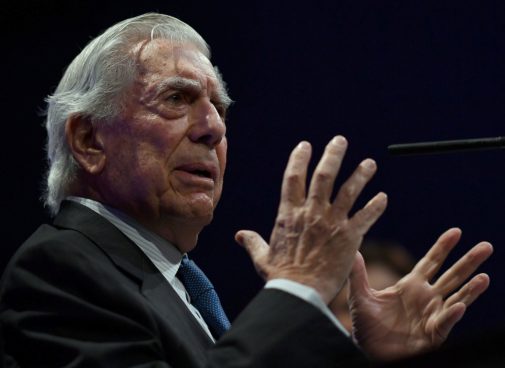- Essay. "But do you know any Spanish liberal?"
"I thought that democracy was impossible, that we had to seek communist paradise." This is how Mario Vargas Llosa commented on the disappointment that the coup against the democratic government of Jacobo Árnez in Guatemala in 1954 supposed in all of Latin America. This is the scenario in which his latest novel 'Hard Times' (Alfaguara) is developed, whose first edition, already in the street, is 180,000 copies.
The Nobel Prize for Literature fixes the book between 1940 and 1959. The shadow of Rafael Leónidas Trujillo (axis of 'The Feast of the Goat') is present because after the fall of Jacobo Árnez in collaboration with the CIA supported Colonel Carlos Castillo Armas. Trujillo, who provided him with men and weapons, asked him for three conditions: that he be invited to Guatemala, that he be returned alive by a general who had fought against him and that he received the award of the Quetzal to its fullest degree. He did not keep any of the three promises, hence he was one of those who finished him. Trujillo used, for this 'operation', with a character that already 'appeared' in 'The Goat Party', Abbas García , who was his intelligence chief.
Vargas Llosa became interested in this nebulous story and of which there are not many certainties at a dinner just over three years ago in Santo Domingo. "Mario, I have a story for you to write," said journalist, novelist and poet Tony Raful . Vargas Llosa was intrigued by Trujillo's involvement in Árbenz's fall and ... until today. "I researched on my own and saw that there was information." "The fall of Árbenz was neuralgic in Latin America. We went out to protest at that wicked outrage. I remember that because I was in the university. It was the Cold War years. If that had not happened, Fidel Castro would not have radicalized His speech of Moncada in 1953, 'History will absolve me', was of a social democrat. "
The Peruvian and Spanish novelist remarks that "a period of terrorism was opened and the image of the United States" that was projected in young people was a lack of democracy and caused the belief "in the revolution in the manner of Cubans. Árbenz wanted a modern and fair society, to get Guatemala out of feudalism. When it came to power, of the three million inhabitants of the country, 70 percent were indigenous people who spoke up to 15 different languages. "
Árbenz lived a painful exile. "He was ridiculed, accused of being a coward, two of his children committed suicide, he was almost drunk ... And he died drowned in a bathtub in Mexico" under no clear circumstances. "Claiming him is an obligation."
Vargas Llosa recalled, received by more than thirty photographers and television cameras at the Casa de América in Madrid that 'La fiesta del Chivo' was published 20 years ago. "I am older. And now I feel more insecure than when I started writing my first stories . The practice does not give security. For the fear of disappointing the public, or for the ghosts that might assault me when facing the paper, for fear of not getting what he had proposed to me. " Along with fear, panic to fail there are also moments of exaltation when I find an open door to what I did not suspect. "
"Do not believe me, do not believe me, read the book without prejudice. I hope you have succeeded in something that I have written," she said vigorously at the watchful eye of Pilar Reyes , editor of Alfagura.
On the difficult current situation that Peru is going through, he declined to comment. And he said that today, in Latin America, "there are no longer military dictatorships but ideological, very imperfect democracies and much populism and nationalism that wreaks havoc . " And he remembered when he arrived in Spain in 1958 with a scholarship to study. That Spain was "underdeveloped. At the University of San Marcos de Lima we had more information about the world than at the Complutense. Spain was transformed by a wonderful transition, by a wonderful transition that admired the entire world. Spain is a modern country that left behind the tribe. I wish Latin America "followed suit, he came to say.
"This is a novel not a history book . Where there were gaps, blank moments, I have put fantasy. There are historical characters with additions of fiction. And basic facts that are impossible to falsify. As in 'War and Peace', one of the novels that I like the most. Some battles did not happen as Tolstoy told them but he does not lie. When I start a novel I do not know what will come up. We must investigate to lie knowingly. "
According to the criteria of The Trust Project
Know more- culture
- literature
LiteratureArturo Pérez-Reverte: "Pride is useful in times of crisis because it keeps you upright"
Literature Jordi Soler: "Leisure no longer exists; today is only the time we fill with television series"
The Paper Sphere Wolfram Eilenberger: "The identity issue must be taken from the extreme right"

